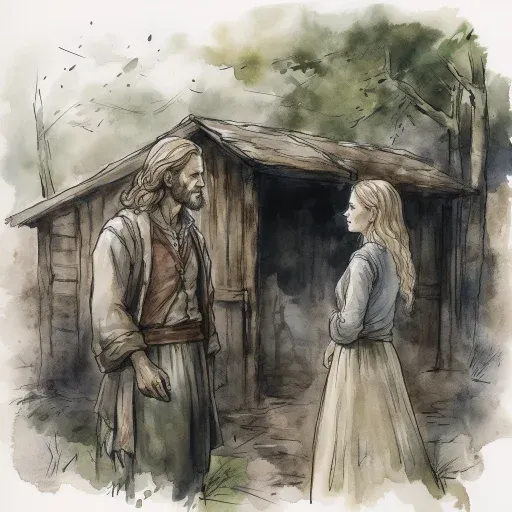BY JAMES BALDWIN
King Alfred and the Beggar
Famous Stories Retold: Story 2 of 50

Heading

Compassion: King Alfred was known for his compassion and care for his people.
Beggar: One day, he gave away his last loaf of bread to a beggar, trusting that God would provide for him.
A good book we like, we explorers. That is our best amusement, and our best time killer
- Roald Amundsen, Explorer
King Alfred's Mysterious Encounter: The Beggar's Story
Unravel the intricate threads of history as we delve into the captivating saga of King Alfred and the Beggar. This tale, steeped in mystery and morality, has echoed through the ages, proving its relevance time and again. Why does this story continue to intrigue us, you may wonder? As we journey through this narrative, you'll understand the profound impact it had on shaping the perception of leadership and virtue. By the end, the enigmatic veil surrounding this legend will be lifted, revealing its true essence. Hold on to your curiosity, as we are about to embark on an enlightening voyage into the past.
The Historical Context of King Alfred's Reign
King Alfred the Great, as history fondly remembers him, ascended to the throne in a time of intense upheaval. The late 9th century was marked by frequent Viking invasions that threatened the very existence of the Anglo-Saxon kingdoms. Alfred's reign, starting from 871, stands as an emblem of resistance against these invasions. Despite early setbacks, his strategic military reforms and diplomatic acumen eventually led to significant victories. Additionally, Alfred was a patron of learning, a trait that was unusual for a king in those tumultuous times. He initiated a cultural and educational revival, translating classical works into Old English, making them accessible to his subjects. Thus, the historical context of King Alfred's reign was a blend of military resilience and cultural renaissance.
The Significance of the Beggar's Role
The beggar in the story played a significant role in highlighting the strength of King Alfred's character. In many ways, the beggar serves as a mirror to Alfred's humility and understanding of his subjects' hardships. Without knowing the true identity of the king, the beggar treated him like any other man, scolding him for his negligence. This interaction underscores the king's ability to empathize with his subjects, irrespective of their social standing. Furthermore, it symbolizes the democratic values that King Alfred stood for. Thus, the beggar's role in this narrative is crucial for understanding the core principles of King Alfred's rule.
Podcast
The Impact of the Incident on King Alfred's Rule
The encounter between King Alfred and the beggar was not just a happenstance, but a pivotal moment that significantly impacted Alfred's rule. This incident, in many ways, served as a turning point leading to a transformation in his reign.
Following the incident, Alfred became more compassionate and egalitarian in his ruling style. The encounter with the beggar brought him face-to-face with the reality of his subjects’ lives, pushing him to implement reforms that aimed to alleviate the suffering of the less fortunate in his kingdom. This incident also taught him humility and patience, traits that were reflected in his subsequent rulings. This drastic change in his leadership style endeared him to his subjects, and his reign is remembered as one of the most successful in English history.

How the Tale Shapes the Perception of King Alfred
The story of King Alfred and the beggar has played a significant role in shaping our perception of him. It humanizes the King, presenting him as more than just a ruler, but as a man capable of empathy and change. The tale depicts Alfred not as an isolated monarch, but as a leader who was in touch with the realities and hardships of his people.
This story also presents King Alfred as a humble and wise ruler, one who was capable of learning from his mistakes and growing from them. It paints him as a man of the people, one who understood their struggles and strived to improve their lives. This portrayal of King Alfred has influenced how we view him today, as a compassionate and wise ruler, whose reign was marked by justice and fairness.
The Legacy of the King Alfred and the Beggar Story
The legacy of the King Alfred and the Beggar story is multifaceted. On one hand, it serves as a historical account that provides insight into the kind of ruler Alfred was. On the other hand, it presents a moral lesson on humility, compassion, and the importance of understanding and empathizing with the plight of the less privileged.
The story has been passed down through generations, and even today, it is told as a tale of transformation and empathy. It has been immortalized in literature, art, and popular culture, reflecting its enduring appeal and relevance. The tale of King Alfred and the beggar continues to inspire and teach, reminding us of the potential for change and the power of compassion.
Conclusion
In essence, the tale of King Alfred and the Beggar is a timeless testament to the virtues of humility, compassion, and leadership. This narrative, with its rich historical context and profound implications, continues to shape our understanding of King Alfred's rule and legacy. The beggar's role, pivotal yet enigmatic, serves as a mirror reflecting the king's character and values. The impact and significance of this encounter echo through the annals of history, reminding us of the enduring relevance of this intriguing legend.





